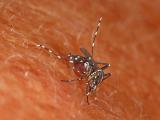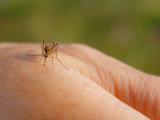Jun 22, 2005 (CIDRAP News) West Nile virus has made its US debut in the heartland this year, with Kansas reporting the first human case.
The Kansas Department of Health and Environment (KDHE) notified the Centers for Disease Control and Prevention (CDC) of one human illness, the CDC announced on Jun 20. The infection had already been found in birds, horses, and mosquitoes in 14 states this year.
A 51-year-old from Douglas County, Kan., became ill in mid-May, the KDHE announced. The case was not neuroinvasive. The first human cases of WNV infection in 2004 occurred in New Mexico and Arizona in the last week of May.
WNV is spread by bites from infected mosquitoes. It was first identified in the United States in 1999 in New York. Human cases have now been found in each of the 48 contiguous states except Washington.
About 17,000 Americans have contracted West Nile virus to date, the CDC said. The disease varies in severity. Most healthy people who are infected experience no illness or only a mild illness. About 20% of those infected show symptoms, typically 3 to 15 days after the mosquito bite, according to the KDHE.
About 1 out of 150 infected people experiences the most severe form, West Nile meningitis or encephalitis, which can sometimes be fatal. West Nile fever is less severe and doesn't involve neurological signs. States are not required to report West Nile fever cases to the CDC.
"This season's first human case of West Nile virus reminds us of the importance of taking precautions to avoid becoming ill," Dr. Lyle Petersen, director of the CDC's Vectorborne Infectious Disease Division, said in a news release. "It's impossible to predict what this year's season will hold. So everyone who spends time outdoors should take steps to protect themselves from mosquito bites and West Nile virus."
Authorities recommended that people limit mosquito exposure by using insect repellents and emptying any standing water where mosquitoes might lay eggs.
To aid prevention, the CDC recently expanded its list of approved insect repellents by adding picaridin and oil of lemon eucalyptus to DEET and permethrin. People should use repellents consistently, because once WNV is endemic in an area, surges in infection rates are unpredictable, the CDC said.
See also:
CDC's West Nile virus site
http://www.cdc.gov/ncidod/dvbid/westnile/index.htm



















